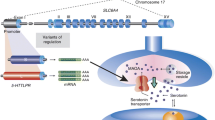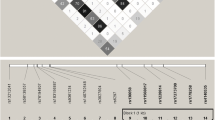Abstract
The serotonin transporter promoter length polymorphism (5-hydroxytryptamine transporter length polymorphism, 5-HTTLPR) in serotonin transporter gene has been implicated in numerous psychiatric disorders. Having a high affinity for the neurotransmitter serotonin (5-hydroxytryptamine, 5-HT), serotonin transporter controls the duration, availability and signaling capacity of 5-HT in the synapse. Association studies have focused extensively on this polymorphic region as the frequencies of long- and short-alleles of this gene differ greatly amongst populations and association studies have either reported conflicting results or nothing significant at all. In this study, the genotype and allele frequencies of 5-HTTLPR polymorphism were determined in the healthy South African (SA) individuals belonging to diverse ethnic backgrounds. Cheek cell samples were collected from the three major ethnic groups namely: Caucasians, Africans and coloreds/Mixed population. The DNA was extracted and genotyped for the 5-HTTLPR. Genotypes were compared amongst the three major ethnic groups from SA as well as to that of other studies around the world. This is the first study to report significant differences in the 5-HTTLPR genotype and allelic frequencies among various ethnic groups in SA. Future studies will target larger population groups and the estimation of frequency of these alleles in individuals with autism.


Similar content being viewed by others
References
Arbelle S, Benjamin J, Golin M, Kremer I, Belmaker R, Ebstein R (2003) Relation of shyness in grade school children to the genotype for the long form of the serotonin transporter promoter region polymorphism. Am J Psychiatry 160:671–676
Bartlett C, Gharan N, Millonig J, Brzustowicz L (2005) Three autism candidate genes a synthesis of human genetic analysis with other disciplines. Int J Dev Neurosci 23:221–234
Beitchman J, Baldassarra L, Mik H, De Luca V, King N, Bender D, Ehtesham S, Kennedy J (2006) Serotonin transporter polymorphisms and persistent, pervasive childhood aggression. Am J Psychiatry 163:1103–1105
Cook E, Courchesne R, Lord C, Cox N, Yan S, Lincoln A, Haas R, Courchesne E, Leventhal B (1997) Evidence of linkage between the serotonin transporter and autistic disorder. Mol Psychiatry 9:264–271
David S, Murthy N, Rabiner E, Munafo´ M, Johnstone E, Jacob R, Walton R, Grasby P (2005) A functional genetic variation of the serotonin (5-HT) transporter affects 5-HT1A receptor binding in humans. J Neurosci 25(10):2586–2590
Guhathakurta S, Ghosh S, Sinha S, Chatterjee A, Ahmed S et al (2006) Serotonin transporter promoter variants: analysis in Indian autistic and control population. Brain Res 1092:28–35
Hariri A, Holmes A (2006) Genetics of emotional regulation: the role of the serotonin transporter in neural function. Trends Cogn Sci 10(4):182–91
Hollister E (2000) Autism and its connection with the neurotransmitter serotonin (online). http://serendip.brynmawr.edu/bb/neuro/neuro00/web1/Hollister.html
Hong C, Cheng C, Shu L, Yang C, Tsai S (2003) Association study of the dopamine and serotonin transporter genetic polymorphisms and methamphetamine abuse in Chinese males. J Neural Transm 110:345–351
Hranilovic D, Stefulj J, Furac I, Kubat M, Balija M, Jernej B (2003) Serotonin transporter gene promoter (5-HTTLPR) and intron 2 (VNTR) polymorphisms in Croatian suicide victims. Soc Biol Psychiatry 54:884–889
Hu X, Lipsky R, Zhu G, Akhtar L, Taubman J, Greenberg B, Xu K, Arnold P, Richter M, Kennedy J, Murphy D, Goldman D (2006) Serotonin transporter promoter gain-of-function genotypes are linked to obsessive-compulsive disorder. Am J Hum Genet 78:815–826
Jacob C, Strobel A, Hohenberger K, Ringel T, Gutknecht L, Reif A, Brocke B, Lesch K (2004) Association between allelic variation of serotonin transporter function and neuroticism in anxious cluster C personaltiy disorders. Am J Psychiatry 161:569–572
Klauck S, Poustka I, Benner F, Lesch K, Poustka A (1997) Serotonin transporter (5-HTT) gene variants associated with autism. Hum Mol Genet 6:2233–2238
Lotrich F, Pollock B, Ferrell R (2003) Serotonin transporter promoter polymorphism in African–Americans: allele frequencies and implication for treatment. Am J Pharmacogenet 3(2):145–147
Murakami F, Shimomura T, Kotani K, Ikawa S, Nanba E, Adachi K (1999) Anxiety traits associated with a polymorphism in the serotonin transporter regulatory region in the Japanese. J Hum Genet 44:15–17
Murphy D, Lerner A, Rudnick G, Lesch K (2004) Serotonin transporter: gene, genetic disorders, and pharmacogenetics. Mol Int 4:109–123
Ojima K, Watanabe N, Narita N, Narita M (2007) Temporomandibular disorder is associated with a serotonin transporter gene polymorphism in the Japanese population. BioPsychoSocial Med 1:3
Otte C, McCaffery J, Ali S, Whooely M (2007) Association of a serotonin transporter polymorphism (5-HTTLPR) with depression, perceived stress, and norepinephrine in patients with coronary disease: the heart and soul study. Am J Psychiatry 164:1379–1384
Pollock B, Ferrell R, Mulsant B, Mazumdar S, Miller M, Sweet R et al (2000) Allelic variation in the serotonin transporter promoter affects onset of paroxetine treatment response in late-life depression. Neuropsychopharmacology 23:587–590
Ramoz N, Reichert J, Corwin T, Smith C, Silverman J, Hollander E, Buxbaum J (2006) Lack of evidence for association of the serotonin transporter gene SLC6A4 with autism. Biol Psychiatry 60:186–191
Reneman L, Schilt T, de Win M, Booij J, Schmand B, van den Brink W, Bakker O (2006) Memory function and serotonin transporter promoter gene polymorphism in ecstasy (MDMA) users. J Psychopharmacol 20(3):389–399
Stoneking M, Fontius J, Clifford S, Soodyall H, Arcot S et al (2007) Alu insertion polymorphisms and human evolution: evidence for a larger population size in Africa. Gen Res 7:1061–1071
White K, Walline C, Barker E (2005) Serotonin transporter: implications for antidepressant drug development. Am Assoc Pharm Sci J 7(2):421–433
Williams R, Marchuk D, Gadde K, Barefoot J, Grichnik K et al (2003) Serotonin-related gene polymorphisms and central nervous system serotonin function. Neuropsychopharmacology 28:533–541
Yu Y, Tsai S, Chen T, Lin C, Hong C (2002) Association study if the serotonin transporter promoter polymorphism and symptomatology and antidepressant response in major depressive disorders. Mol Psychiatry 7:1115–1119
Acknowledgments
The authors are thankful to Autism South Africa and University of the Western Cape for funds provided for the study. The student support provided by National Bioinformatics Network (NBN) is acknowledged. In addition, the help and enthusiasm of Western Cape Education Department, children, parents of children, school staff and volunteers during the swab collection are appreciated.
Author information
Authors and Affiliations
Corresponding author
Rights and permissions
About this article
Cite this article
Esau, L., Kaur, M., Adonis, L. et al. The 5-HTTLPR polymorphism in South African healthy populations: a global comparison. J Neural Transm 115, 755–760 (2008). https://doi.org/10.1007/s00702-007-0012-5
Received:
Accepted:
Published:
Issue Date:
DOI: https://doi.org/10.1007/s00702-007-0012-5




